AARP Eye Center
En español
By Jody McPhillips
Hungry in the West End addresses senior hunger in Providence's West End community -- an area of hard-core poverty burdened further by the recession. This series attempts to put a face on the problem of senior hunger in the West End and throughout America, and to give voice to those who are responding to the challenge of feeding the hungry. This is Part 2 of the series. Start here to begin with Part 1.
How many older Rhode Islanders are hungry?
An educated guess puts the number at more than 5,000—but that’s just a guess.
Unlike income, which can be boiled down to a number, hunger ebbs and flows. People can be well-fed one week and hungry the next—and in fact that happens a lot, as people on fixed incomes run out of money at the end of the month.
And many older people don’t like to say that they are hungry, so they don’t show up in surveys.
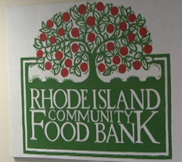
“Some are ashamed to admit that they need food,” says Andrew Schiff , executive director of the Rhode Island Food Bank. “There’s a stigma attached to it.” Watch our interview with Andrew Schiff.
Some numbers can shed light on the situation.
Low-income seniors can qualify for the Supplemental Nutrition Assistance Program (SNAP)—the new name for food stamps. The program can provide several hundred dollars per month to help families buy food, although the average senior benefit is $91 per person.
But are they applying?
People who feed the hungry say they don’t think so. They point to national studies, which show that fewer than one in three people aged 60 and over who qualify apply for SNAP. That’s according to the non-profit organization Feeding America. Statewide, about one in four households receive SNAP benefits.
Rhode Island does keep track of how many people are “food insecure”—meaning they can’t always afford enough food, and may have to cut portion size or skip meals—but does not break down that population by age.
Hungry in the West End - The Video Series








AARPRI
In 2012, Rhode Island ranked first in New England in food insecurity with 67,000 households or about 167,500 individuals, according to the food bank’s 2012 Status Report on Hunger in Rhode Island. In addition, “the number of Rhode Islanders served at food pantries jumped 10 percent last year,” the report states.
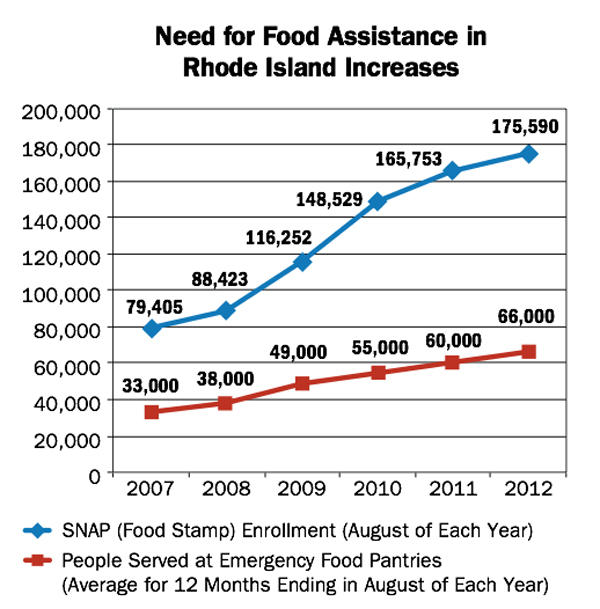
In general, two out of every five food-insecure households will run out of food entirely at some point in the year and experience hunger, Schiff said. (The rest are either cutting back on meals to make their food dollars stretch, or they are worrying about having to do so.)
Two-fifths of 167,500 would be almost 42,000 people—but how many of them are elderly?
According to the state Division of Elderly Affairs, the US Census says Rhode Island had 1,069,725 residents in 2006. Of those, 194,533 (or 18.2 percent) were aged 60 or older. Eighteen percent of 42,000 would be 7,560 older people who experience hunger—but that is at best an approximation.
The true number could be lower, but it is more likely to be higher.
Across the board, SNAP participation is up sharply. In 2007, 79,405 Rhode Islanders were enrolled in the program; in 2012, that number has more than doubled, to more than 175,000.
Maria Cimini, at the Feinstein Center for a Hunger-Free America at the University of Rhode Island SNAP Outreach Project, says the increase can be attributed to three things: "First, I would like to think that Outreach is doing a good job. But additionally, there have been many program changes that have both increased eligibility and and reaching some new populations. And we have made participation in the program a little bit easier."
Cimini who also serves as a Democratic State Representative whose district is in Providence, says that a 16-page application, identified as intimidating seniors, has been reduced to a three-page document. She also notes that senior participation is on the rise as the stigma of accepting what once was called food stamps has been diminished -- although in some cases it's simply because desperate situations give seniors no alternatives.
Watch as Maria Cimini explains who qualifies for SNAP and how the SNAP Project makes people, including seniors, more aware of the program.
Watch
Maureen Maigret of the Senior Agenda Coalition of Rhode Island says Rhode Island’s older citizens are not a rich group. “If you look at household income, the median for a 65-plus household in 2010 was $33,192,” she says. “That isn’t much.”

In the West End, which is close to 65% Hispanic, the numbers tell their own story:
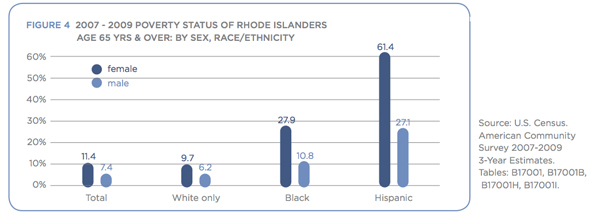
Watch our interview with Maureen Maigret.
One other set of numbers indicates that people aren’t taking full advantage of the SNAP program.
The Department of Human Services says that based on income, 257,788 people statewide—about one in four--should be eligible for SNAP. With actual participation at 175,000, that’s nearly 83,000 people who are not taking part in the program.
The SNAP program is not the only way economically stressed people can put food on the table.
The state has more than 200 food pantries, meal sites and soup kitchens, many run by faith communities. As the economy has faltered, their business has boomed. Says RI Food Bank’s Schiff, “The number served at food pantries has gone up significantly over the past few years, from 38,000 per month in 2008 to 66,000 today.”
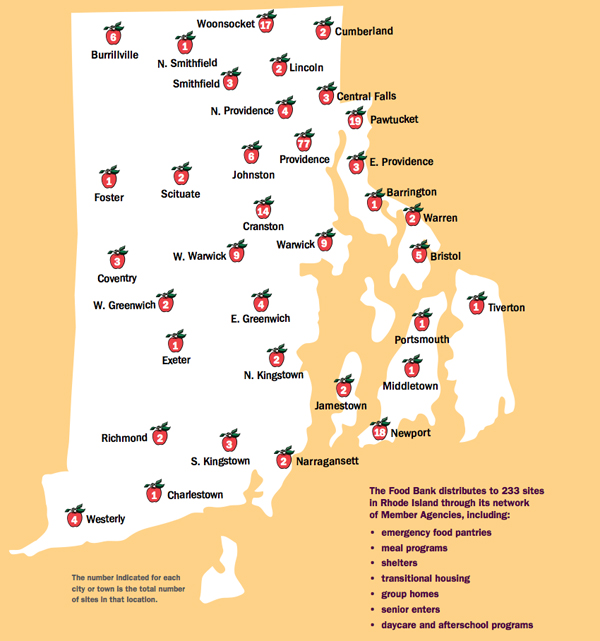
The people who run the kitchens and pantries say they see plenty of older people coming in, and the numbers are on the rise. They say they are more worried about the people they don’t see—those who may be too frail or ill to leave their homes.
Many of those, of course, are served by Meals on Wheels, which provides between 1,650 and 1,700 meals a day to the elderly, with most of those meals delivered to homes. It also supplies prepared meals to eight senior centers in Providence and Little Compton.
“Our clients are mostly female,” says Heather Amaral, executive director of the state office. “Meals on Wheels is not means-tested—you can qualify if you are 60 years old or older” for the home-delivered food, and 55 or older for the meal sites.
“Last year we served about 37,000 meals at the eight sites, and 383,000 were home-delivered.”
William Flynn, at the Senior Agenda Coalition of Rhode Island, says that as state and national governments wrestle with budget deficits, the safety net for seniors is shrinking just when it needs to increase.
Rhode Island, he notes, has the greatest percentage of residents aged 85 and over in the country. And while many are cared for by family or served by social safety net programs, increasing numbers are not.
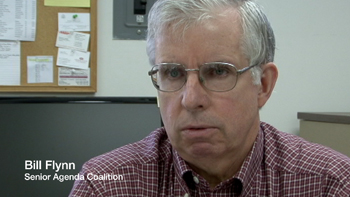
For example, “it’s clear that the West End has the lowest-income seniors in (Providence),” he says. And yet “there are minimal programs in the West End for seniors.”
While wealthier communities have been able to make up for funding cuts by tapping private donations, he said, that’s generally not the case in low-income areas.
“When you don’t have a robust senior center in that area, with so many low-income seniors, it creates a problem for the state as well because you don’t have a delivery system” for the programs that do exist, he says. “The days of social workers going door to door and knocking on doors are long gone, unfortunately.”
He believes that many of us believe that with Medicare and Social Security, the problem of senior poverty has been solved, but it is just not so.
“There’s a neglect of the importance of so many low-income seniors out there, so many who are isolated,” Flynn says. “It’s not seen as an important social problem. We need some more champions in our legislature who really get it that there are going to be more and more low-income seniors.” Watch John Martin's interview with Bill Flynn.
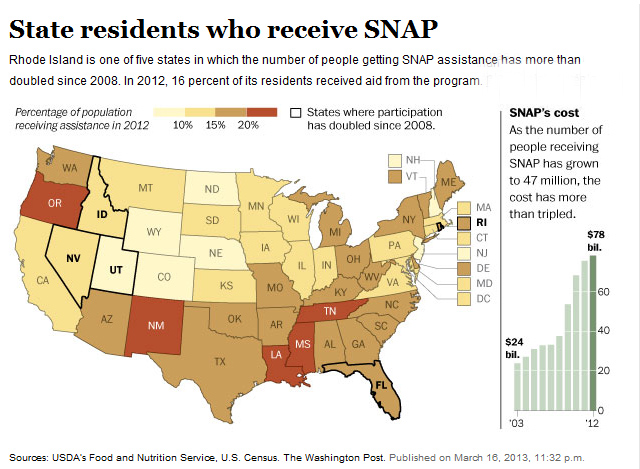
Hungry in the West End
AARPRI
Explore Jody McPhillips' Web series
Part 1: The Problem is Simple, But Not the Solution
Part 2: Feeding People Too Ashamed to Ask for Help
Part 3: Meals on Wheels Feeds the Homebound
Part 4: Food Pantries Feed All Comers
Part 5: Food & Friendship Served Up at St. Martin de Porres
Part 6: Nutritionists Help Seniors to Eat Right
Part 7: At 88, Theresa Gives Food Stamps a Second Try
Part 8: Volunteers Serve From the Heart, Get Back More Than They Give
Watch John Martin's Hungry in the West End documentary series
Episode 1: The Growing Problem
Episode 2: Doing More with Less
Episode 3: Food for the Soul
Episode 4: Emergency
Episode 5: What Is Affordable?
Episode 6: It's Okay
Episode 7: Abundance
Episode 8: "It's Good Work"
Hunger news
The Postal Service's "Stamp Out Hunger" day is May 11. Watch the video.
RI Monthly: Interview with John Martin on Hungry in the West End
TakePart.com: America's Grandparents Are Hidden Victims of Hunger Crisis
Enid Borden: Ending Senior Hunger Must Begin Today
Hunger News From TakePart.com
Ezra Klein on senior isolation: "Call Your Grandmother."
Governor Chafee Releases Report on RI SNAP, Welfare Fraud. Download the Report.
Washington Post: Food Stamps Put Rhode Island Town on Monthly Boom-and-Bust Cycle
RI Farmers Markets Growing...with Some Pain
Chaffee Kicking Off March for Meals Campaign
New York Times: More to Meal Delivery Than Food
Drive to End Hunger Launches 2013 Season in Daytona
US Conference of Mayors: Slow Recovery Keeps Pressure on Emergency Food and Shelter Services
AARP Announces Million Dollar Partnership to Fight Older Adult Hunger
Drive to End Hunger's Jeff Gordon Leads Pack of Celebrity Hunger Advocates.
Hambre en America: ¿Que podemos hacer?
























































